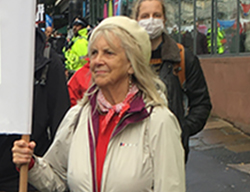

There are ten things wrong with Barclay and Whately’s plan to give the NHS £200m to buy beds in care homes, hotels, hospices and independent hospitals
Gilda Peterson, Leeds KONP and Secretary, End Social Care Disgrace
Difficulties discharging over thirteen thousand patients safely are slowing the flow through hospitals while being stuck in hospital when you don’t need medical care is both mentally and physically harmful. People risk picking up hospital acquired infections, muscle loss and impaired mobility, reduced confidence and independence skills.
So what’s not to like about Barclay’s plan? Sadly quite a lot.
- Beds without wraparound support are not ‘beds’, just sticks of furniture. The Government says that“Discharged patients will be given the support they need from GPs, nurses and other community-based clinicians to continue their recovery” which seems a case of flying ‘on a prayer, no wing’ at a time when exhausted GPs are voting with their feet and district nurse numbers have halved in a decade, leaving just one district nurse for every 14,000 people.
- The plan to block book beds in residential care to enable some 2,500 people to be released from hospitals when they are medically fit to be discharged could encourage institutionalisation as the government’s own guidance indicates that less than 5% of people discharged from hospital will need ‘24-hour bedded care’. Richard Humphries from the Health Foundation has warned that there is a real danger that the risks of staying too long in hospital will be transferred to care homes, especially where placements are rushed, with little access to rehabilitation and enhanced health care or in places far away from home.
- Shifting people into hotels is also a non-starter unless the required, skilled support staff and vital equipment is in place. Hotel accommodation also raises a raft of additional concerns regarding accessibility, safety and hygiene, some of which have emerged when hotels were used to deal with Covid emergencies. Caroline Abrahams, director at Age UK said “Hotels are not an appropriate place to provide high-quality care for older people in need of support to recuperate after a spell in hospital” and suggested the policy was “a sad indictment of successive failure to invest in a stable, functioning social care system capable of providing the right help at the right time” and was a “sticking plaster solution”.
- All the talk is about money and freeing up care home beds. Nothing is being said about what choice and control people are likely to have over their discharge. Richard Humphries, Senior Policy advisor to the Health Foundation notes that in the rush to clear hospital beds, legal safeguards in relation to mental capacity and choice could easily fall by the wayside. It is already the case that people are shunted from acute wards to longer term wards and into care homes, often miles from home, without any real choice in the matter. They can then get stuck in a place which friends and relatives find hard to visit and rapidly lose the familiar links and relationships which are the warp and weft of wellbeing. Others who are desperate to go home have their wishes denied because of a lack of community support. Relatives may feel pressured to take on more than it is realistic for them to do, then like many of the 8 million unpaid carers find that they are sinking without practical or financial support. Half of the 14 million people in poverty are affected by disability either directly or within the family.
- The whole project is saturated with short-termism with funding allocated until March and support for each person set to last only four weeks. Even if skilled staff can be instantly conjured up and dropped into place, helping people to recover the mobility, independence skills and confidence needed to return home safely and getting threadbare services in place in the community all takes time. If people are not to be booted out prematurely, many will have to start paying what could be huge fees just to stay put and some will get totally stuck. The chief of the NHS Confederation, Mathew Taylor, has said that the plans risked discharged patients being placed in residential care ‘inappropriately’ and then remaining there ‘indefinitely’. He also pointed out that while the funding was welcome, the push to move people out of hospital could have ‘unintended consequences’ for primary care, by putting ‘additional pressure’ on ‘already very stretched’ services.
- The plan is driven by the needs of the NHS. Although efforts are made to avoid using the term “bed blocking”, as this has been rightly criticised for invidiously blaming patients for a situation not of their making, sidestepping the label doesn’t disguise what is going on, which is indeed one effort among many to individualise social and political issues. In this case it is very handy for the Government to divert public attention from over a decade of deliberate underfunding and running down of the NHS and total neglect of social care. For people at the sharp end of the process this is unfair, demeaning and psychologically damaging. It reflects the deep-rooted devaluing and dispossession of older and disabled people within our profit driven, capitalist society which in turn allows them to be shuffled about like problem parcels.
- Residents can find their “home” closing round them and be passed on like items of furniture. As three of the big five providers who make up one fifth of the sector are private equity funded and rely on high levels of borrowing and complicated corporate structures, they are particularly unstable. Local Authorities who have lost almost all of their own provision over the years are increasingly less able to step in and help when private firms go bust or walk away. Two of the big five private providers – Southern Cross in 2011 and Four Seasons in 2019 went into administration.
- Most of the public money to buy care home beds will go to private firms as they own 84% of care home beds. This means more public money will be siphoned off into private pockets. Providers are also using this opportunity to ratchet up fees. Care England, which represents the largest private care home providers, said they wanted the government to pay them £1,500 a week per person, close to double current charges, citing the need to pay care workers more and hire rehabilitation specialists to try to get people home. However with a shortage of 165,000 care and support staff and 130,000 NHS staff it is almost impossible to imagine that care homes are going to recruit staff with the skills to rehabilitate people and get them home speedily or that the extra money they are asking for will go on training and on giving staff decent rates of pay. These private providers are the same companies who have been holding down wages for care and support staff to an average £9.50 per hour and frequently refused sick pay, with dangerous consequences through the pandemic.
- Some of the money is being used to pay for private brokerage services to find step down beds. One of the biggest companies, “Carehome Selection” has boosted its revenue by 75% – to more than £20m- since 2018. They have just signed a three month, £223,000 contract with Leeds City Council. Some Councils have been using funds from the earlier but delayed £500m allocation to facilitate hospital discharges to outsource social work assessments because chronic underfunding has decimated social work capacity. In May last year a survey by the Association of Directors of Adult Social Care revealed that half a million people were waiting for assessments, reviews and/or care support to start.
- Putting the NHS (now a plethora of “Integrated Care Systems”) in charge of organising social care also rolls the wheels further down the road of Social Care being sucked into the NHS further jeopardising the long struggle of disabled people for independent living, a life like everyone else, within communities designed for all.
The End Social Care Disgrace Campaign (ESCaD) takes a stand against the commodification, neglect and devaluing of older and disabled people, encourages resistance to all measures which further immiserate and marginalise disabled people of all ages and calls for the setting up of a radically re-visioned, not-for-profit, publicly provided, National Care, Support and Independent Living Service. This must be designed and developed with service users, unpaid carers, care and support workers and local communities, and be underpinned by a well-paid and valued workforce
See our seven demands here: https://www.nacsils.co.uk. Email: [email protected] to be put on our mailing list or text /phone 07419295754 and support the campaign!
Gilda Peterson, Leeds KONP and Secretary, End Social Care Disgrace

THIS NEEDS SAYING LOUD AND PUBLICISING MORE – MOST PEOPLE WIHOUT DIRECT EXPERIENCE DON’T KNOW THIA IS GOING ON